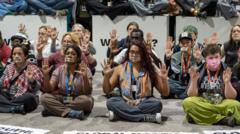The conclusion of COP29, the United Nations climate conference, has left many developing nations frustrated and unsatisfied with a climate finance agreement they consider insufficient. The newly agreed upon $300 billion, effective by 2035, is viewed as an improvement from the previous $100 billion commitment, yet many feel it is merely a superficial fix to a growing crisis. Activists and delegates from multiple nations gathered in Baku to advocate for richer countries to honor their responsibilities in providing adequate financial support, leading to a palpable tension throughout the conference.
Indian delegate Chandni Raina aptly captured the sentiment of many in the developing world, denouncing the deal as an "optical illusion" that fails to address the monumental challenges posed by climate change. Multiple voices from poorer nations outlined their inability to understand why wealthier countries had waited until the last minute to unveil what they considered a marginal improvement in support. Despite immense pressure, the developing countries ultimately acquiesced to the deal, fearing that negotiations with a potential return of President Trump's climate skepticism would yield even less favorable terms.
The combating perspectives serve to highlight the stark divide between rich and developing nations. Advocates for the agreement argue that it is a necessary step forward, while critics contend that without more robust financial commitments, the battle against climate change will falter. In terms of emission growth, poorer nations now account for 75% of global emissions increases; thus, it is in the interest of rich countries to assist in mitigating these emissions for the global good.
Beyond the financial negotiations, organizational shortcomings were on full display during the conference. Azerbaijani President Ilham Aliyev's dismissal of the urgency of climate action—calling oil and gas a "gift from God"—coupled with his critiques of Western media, fostered a climate of frustration among negotiators. Many senior climate leaders privately disclosed their grievances, referring to COP29 as potentially the worst in recent memory, and some went as far as calling for systemic reform of the COP process.
In the backdrop, China’s involvement in climate discussions is becoming increasingly pivotal. While officially recognized as a developing country, it offered to contribute to the climate finance fund under voluntary terms. This strategic positioning allows China to claim a leadership role, especially when the future varied the U.S. stance under Trump remains uncertain.
Negotiators voiced hopes of establishing a climate agreement that would "Trump-proof" international climate efforts. Despite profound discontent regarding the financial deal, richer nations appear to embrace a future where engaging China could ultimately benefit global climate diplomacy.
As COP29 proceeded, a noticeable shift occurred from environmental NGOs and activists, who utilized more confrontational tactics to express dissatisfaction with the proceedings. Notably, one incident saw climate envoy John Podesta endure calls of "shame," signaling a more assertive approach from campaigners.
As COP29 draws to a close, it is clear that more than mere financial sums are at stake. Whether the climate community can unite in the face of growing geopolitical divisions remains in question, as activists and nations will be closely monitoring the implications of these negotiations moving forward.




















